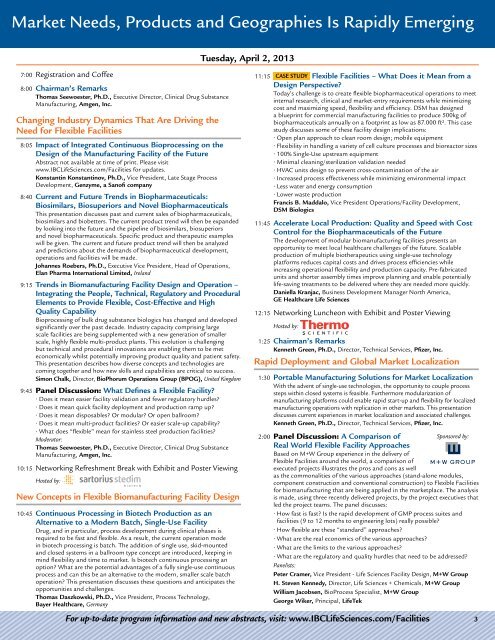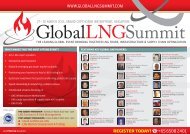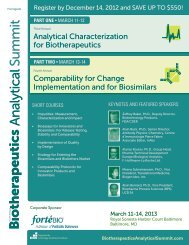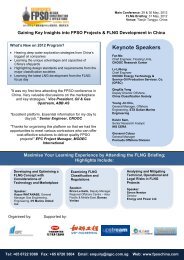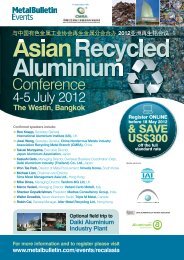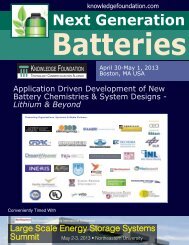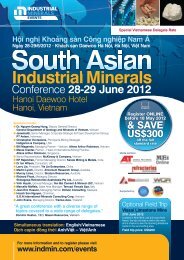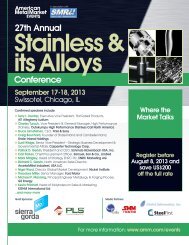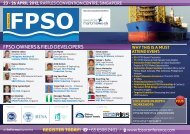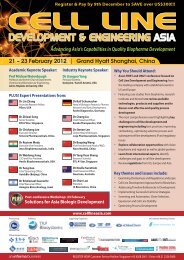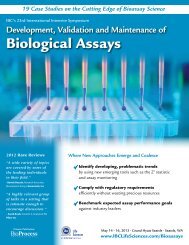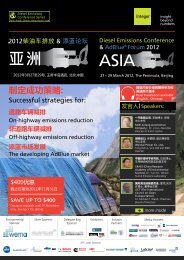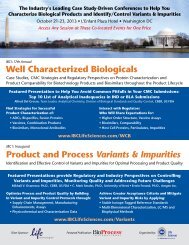Flexible Facilities
Flexible Facilities
Flexible Facilities
Create successful ePaper yourself
Turn your PDF publications into a flip-book with our unique Google optimized e-Paper software.
Market Needs, Products and Geographies Is Rapidly Emerging<br />
Tuesday, April 2, 2013<br />
7:00 Registration and Coffee<br />
8:00 Chairman’s Remarks<br />
Thomas Seewoester, Ph.D., Executive Director, Clinical Drug Substance<br />
Manufacturing, Amgen, Inc.<br />
Changing Industry Dynamics That Are Driving the<br />
Need for <strong>Flexible</strong> <strong>Facilities</strong><br />
8:05 Impact of Integrated Continuous Bioprocessing on the<br />
Design of the Manufacturing Facility of the Future<br />
Abstract not available at time of print. Please visit<br />
www.IBCLifeSciences.com/<strong>Facilities</strong> for updates.<br />
Konstantin Konstantinov, Ph.D., Vice President, Late Stage Process<br />
Development, Genzyme, a Sanofi company<br />
8:40 Current and Future Trends in Biopharmaceuticals:<br />
Biosimilars, Biosuperiors and Novel Biopharmaceuticals<br />
This presentation discusses past and current sales of biopharmaceuticals,<br />
biosimilars and biobetters. The current product trend will then be expanded<br />
by looking into the future and the pipeline of biosimilars, biosuperiors<br />
and novel biopharmaceuticals. Specific product and therapeutic examples<br />
will be given. The current and future product trend will then be analyzed<br />
and predictions about the demands of biopharmaceutical development,<br />
operations and facilities will be made.<br />
Johannes Roebers, Ph.D., Executive Vice President, Head of Operations,<br />
Elan Pharma International Limited, Ireland<br />
9:15 Trends in Biomanufacturing Facility Design and Operation –<br />
Integrating the People, Technical, Regulatory and Procedural<br />
Elements to Provide <strong>Flexible</strong>, Cost-Effective and High<br />
Quality Capability<br />
Bioprocessing of bulk drug substance biologics has changed and developed<br />
significantly over the past decade. Industry capacity comprising large<br />
scale facilities are being supplemented with a new generation of smaller<br />
scale, highly flexible multi-product plants. This evolution is challenging<br />
but technical and procedural innovations are enabling them to be met<br />
economically whilst potentially improving product quality and patient safety.<br />
This presentation describes how diverse concepts and technologies are<br />
coming together and how new skills and capabilities are critical to success.<br />
Simon Chalk, Director, BioPhorum Operations Group (BPOG), United Kingdom<br />
9:45 Panel Discussion: What Defines a <strong>Flexible</strong> Facility<br />
• Does it mean easier facility validation and fewer regulatory hurdles<br />
• Does it mean quick facility deployment and production ramp up<br />
• Does it mean disposables Or modular Or open ballroom<br />
• Does it mean multi-product facilities Or easier scale-up capability<br />
• What does “flexible” mean for stainless steel production facilities<br />
Moderator:<br />
Thomas Seewoester, Ph.D., Executive Director, Clinical Drug Substance<br />
Manufacturing, Amgen, Inc.<br />
10:15 Networking Refreshment Break with Exhibit and Poster Viewing<br />
Hosted by:<br />
New Concepts in <strong>Flexible</strong> Biomanufacturing Facility Design<br />
10:45 Continuous Processing in Biotech Production as an<br />
Alternative to a Modern Batch, Single-Use Facility<br />
Drug, and in particular, process development during clinical phases is<br />
required to be fast and flexible. As a result, the current operation mode<br />
in biotech processing is batch. The addition of single use, skid-mounted<br />
and closed systems in a ballroom type concept are introduced, keeping in<br />
mind flexibility and time to market. Is biotech continuous processing an<br />
option What are the potential advantages of a fully single-use continuous<br />
process and can this be an alternative to the modern, smaller scale batch<br />
operation This presentation discusses these questions and anticipates the<br />
opportunities and challenges.<br />
Thomas Daszkowski, Ph.D., Vice President, Process Technology,<br />
Bayer Healthcare, Germany<br />
11:15 CASE STUDY <strong>Flexible</strong> <strong>Facilities</strong> – What Does it Mean from a<br />
Design Perspective<br />
Today’s challenge is to create flexible biopharmaceutical operations to meet<br />
internal research, clinical and market-entry requirements while minimizing<br />
cost and maximizing speed, flexibility and efficiency. DSM has designed<br />
a blueprint for commercial manufacturing facilities to produce 500kg of<br />
biopharmaceuticals annually on a footprint as low as 87.000 ft². This case<br />
study discusses some of these facility design implications:<br />
• Open plan approach to clean room design; mobile equipment<br />
• Flexibility in handling a variety of cell culture processes and bioreactor sizes<br />
• 100% Single-Use upstream equipment<br />
• Minimal cleaning/sterilization validation needed<br />
• HVAC units design to prevent cross-contamination of the air<br />
• Increased process effectiveness while minimizing environmental impact<br />
• Less water and energy consumption<br />
• Lower waste production<br />
Francis B. Maddalo, Vice President Operations/Facility Development,<br />
DSM Biologics<br />
11:45 Accelerate Local Production: Quality and Speed with Cost<br />
Control for the Biopharmaceuticals of the Future<br />
The development of modular biomanufacturing facilities presents an<br />
opportunity to meet local healthcare challenges of the future. Scalable<br />
production of multiple biotherapeutics using single-use technology<br />
platforms reduces capital costs and drives process efficiencies while<br />
increasing operational flexibility and production capacity. Pre-fabricated<br />
units and shorter assembly times improve planning and enable potentially<br />
life-saving treatments to be delivered where they are needed more quickly.<br />
Daniella Kranjac, Business Development Manager North America,<br />
GE Healthcare Life Sciences<br />
12:15 Networking Luncheon with Exhibit and Poster Viewing<br />
Hosted by:<br />
1:25 Chairman’s Remarks<br />
Kenneth Green, Ph.D., Director, Technical Services, Pfizer, Inc.<br />
Rapid Deployment and Global Market Localization<br />
1:30 Portable Manufacturing Solutions for Market Localization<br />
With the advent of single-use technologies, the opportunity to couple process<br />
steps within closed systems is feasible. Furthermore modularization of<br />
manufacturing platforms could enable rapid start-up and flexibility for localized<br />
manufacturing operations with replication in other markets. This presentation<br />
discusses current experiences in market localization and associated challenges.<br />
Kenneth Green, Ph.D., Director, Technical Services, Pfizer, Inc.<br />
2:00 Panel Discussion: A Comparison of<br />
Sponsored by:<br />
Real World <strong>Flexible</strong> Facility Approaches<br />
Based on M+W Group experience in the delivery of<br />
<strong>Flexible</strong> <strong>Facilities</strong> around the world, a comparison of<br />
executed projects illustrates the pros and cons as well<br />
as the commonalities of the various approaches (stand-alone modules,<br />
component construction and conventional construction) to <strong>Flexible</strong> <strong>Facilities</strong><br />
for biomanufacturing that are being applied in the marketplace. The analysis<br />
is made, using three recently delivered projects, by the project executives that<br />
led the project teams. The panel discusses:<br />
• How fast is fast Is the rapid development of GMP process suites and<br />
facilities (9 to 12 months to engineering lots) really possible<br />
• How flexible are these “standard” approaches<br />
• What are the real economics of the various approaches<br />
• What are the limits to the various approaches<br />
• What are the regulatory and quality hurdles that need to be addressed<br />
Panelists:<br />
Peter Cramer, Vice President - Life Sciences Facility Design, M+W Group<br />
H. Steven Kennedy, Director, Life Sciences + Chemicals, M+W Group<br />
William Jacobsen, BioProcess Specialist, M+W Group<br />
George Wiker, Principal, LifeTek<br />
For up-to-date program information and new abstracts, visit: www.IBCLifeSciences.com/<strong>Facilities</strong> 3


